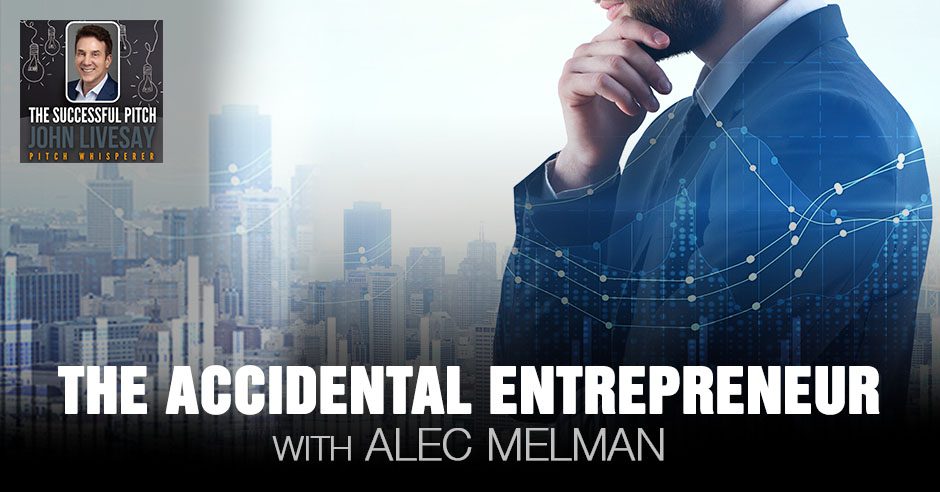The Accidental Entrepreneur With Alec Melman
Posted by John Livesay in podcast0 comments

The road to entrepreneurship isn’t always a one-way path. For example, today’s guest considers himself an accidental entrepreneur. Alec Melman is the CEO and co-founder of Gotham Artists. In this episode, he chats with host John Livesay about how he went from journalism to law school and now manages his own business using all his accumulated skills. Plus, Alec discusses what makes Gotham Artists stand out from other speaker agencies and why forging relationships is valuable. Stay tuned for a fun conversation on entrepreneurship and how it’s not too late for you to make it too!
—
Listen to the podcast here
The Accidental Entrepreneur With Alec Melman
Our guest for this episode is Alec Melman, who’s the CEO and Cofounder of Gotham Artists. He tells a great story of how he got from law school into being a cofounder of a talent agency that represents speakers and entertainers. He talks about himself as an accidental entrepreneur who takes risks. His one big secret is creating a seamless experience for buyers. Enjoy the episode.
—
Our guest is Alec Melman, who was raised in Brooklyn, New York, long before he became cool. He is a graduate of the University of Maryland and New York Law School. He’s also a member of the New York State Bar and Notary. For some reason, we’ll find out why. He is an East Coast guy. He is also someone that is involved in the world of entertainment and speakers. He founded Gotham, which is something that is a unique hybrid, from what I can see, of not just entertainers and comedians but also speakers. Alec, welcome to the show.
Thanks for having me, John.
Let’s go back and hear your own little story of origin. I don’t get many speaking bureau founders or talent agency founders who also have a Law degree. I’m sure that came in handy but you can go back to childhood. Did you have a passion for certain comics or something? How did this all evolve from that to law school to where you are?
I grew up in Brooklyn. I thought I was going to be in entertainment, an entertainer, writer, performer or something like that. I went to Stuyvesant High School, which is my greatest academic achievement.
Tell us why that’s impressive for those of us who don’t know.

The Accidental Entrepreneur: We’re always going to send that extra email to check on something.
It has a harder rate of acceptance than Harvard does, for example, based on the number of students in New York City who apply for the specialized high schools. I got in by the skin of my teeth, a couple of points and it changed the direction and course of my life. I met some of my high school friends in various ways. They’ve come back to help me. To that end, my friend from high school and I wanted to be writers. I went to Maryland. I studied Journalism there and didn’t know what to do next.
The job market wasn’t great. I said, “Here’s a great idea. Let’s go to law school.” The thinking was, “If the writing career or acting career doesn’t take off, let me focus on entertainment law in law school. I could at least be a resource to my talent and friends and help them navigate that world.” I focused on copyright law, intellectual property and things like that. As everything is in this world, it’s not what you know. It’s who you know.
One of the benefits of growing up in a big city like New York City is you know a lot of people by virtue of you are around a lot of people. I needed part-time work to help pay the bills. My Aunt knew a woman who works for a solo practitioner, Larry Fabian. He was into entertainment law. I said, “Let’s try this.” I worked for him for a year or so. He had a client named Greater Talent Network, which was a big speakers agency. It was acquired by United Talent Agency.
It was around for years and I met the folks there. That’s was my first job right out of law school. I went from law school, took the bar exam, passed the bar exam and then jumped right into working there. I worked there for about three years. I knew immediately I didn’t want to be a lawyer. On the second day of law school, I was like, “This was a mistake.”
I should have sat in on a class at least one time. If I can give any advice to anyone thinking about going to law school, it’s, “Go sit on one class,” which I’d never done. I was like, “This is what it is.” All things happened for a reason. I wouldn’t change anything. With law school, I went to work for that attorney. With that attorney, I met the folks at Greater Talent Network and because of that, I met my former business partner and cofounder, Daniel Ymar. In 2009, he convinced me to go out on our own and we’ve been at it ever since. In 2021, I took on the CEO role and more of the head of the company.
What I hear often from founders of startups, and you would consider your company a startup years ago, when people are in partnership, what seems to work well is skills that are complementary as opposed to the same. If you’re both great at marketing but nobody has any tech skills, let’s say if it’s a tech startup, that’s not great if you’re both great at tech and no one knows how to market. Would you say that the two of you brought different skills that were complimentary to making Gotham Artists successful?
[bctt tweet=”Entrepreneurs are not afraid to take risks. ” username=”John_Livesay”]
What Daniel brought was the spark. He had the vision. Every time I had an objection, “How are we going to do this,” he had a reason why we could. It was his motivation that got me thinking about it. I remember I was going in for an annual review. I was doing pretty well at the other company. This is 2009. I said, “I want to work from home 1 day in 1 month. I want a higher commission, the basic stuff.” I was rebuffed and I went to Daniel. I was like, “What was that conversation we were talking about?”
That’s so timely with the Great Resignation going on. The fact that you were so cutting edge going, “One day a month.” People are like, “How about 3 days in 1 week?” That’s fascinating.
He gave me the courage to try. It was your classic startup story. I got a $15,000 loan from my sister. He got one from his brother, a family affair from jump street. We worked out of my girlfriend, now wife and mother of my two children’s apartment on the Westside. She would go off to work as a teacher, and her roommates would go off to work. Little did they know that Daniel and I were going to the apartment working all day from there and hustling. Daniel was about to be the father of twins, his first children. We quit a month before his kids were born. I don’t know what he was thinking but I was not married, had no kids, no mortgage and not a lot to lose. It was good timing for me.
You’re growing the business. Did you start representing speakers first or performers first? How did it all begin?
The name ‘Gotham Artists’ is chosen on purpose. It doesn’t say speakers in the title. We were a little bit fortunate that the URL, New York Speaker Bureau, was already taken because we had considered that, but Gotham Artist was available. My mom is the one who came up with the name. We wanted it to be broad enough that we could have flexibility.
One of our angles was we wanted to be the buyer’s advocate. That was the difference in how we were going to approach it. Whereas the bigger speaker agencies with the exclusive clients and big talent agencies represent the talent and artist but who’s looking out for the buyer? In that case, nobody. Our pitch was, “We have access to all the same people. We’re going to be your advocate in the negotiating process and help you get it at the best price of the most seamless experience.” We built up the buyer side.

The Accidental Entrepreneur: Our default is “no harm in asking.”
The other benefit we had was there are a lot of speakers in the market who aren’t exclusive. Bob Woodward is an example we always love to go to. He’s one of our favorite speakers of all time and a delight to work with. He was the same price whether you booked it through Gotham or 1 of 10 other agencies. We had a parody with our much bigger competitors on pricing. They couldn’t beat us on pricing on those non-exclusive so we focused on the non-exclusives and building up buyer relationships.
What happened over time is we got so many great buyer relationships. One of my favorite data points of the company is how much business we retain. We have repeat customers that opened us up to opportunities with speakers because buyers would ask us to go find someone who would open up a relationship with that person. The next thing you know, we started booking with that person. Over the years, while we’re still buyer focus, we’ve taken on a couple of exclusive clients and looked to grow that piece of it but always the person writing the checks is who comes first. That is the client, the buyer and then the talent.
You gave us a great soundbite, a tweet, if you will. “Create a seamless experience for buyers.” That is the essence of what you’re saying here. I know myself as a sales keynote speaker, oftentimes, clients say, “You were so easy to work with and responsive.” That is as important to us as the content and the outcome that we’re seeking, that you’re easy to work with. Can you talk a little bit about what a seamless experience looks like for the buyer?
I can’t tell you how much business we’ve gotten and how many conversations we’ve started with. I worked with so and so in 2021, and it was less than ideal. It’s the polite way to put it. We’re always going to send that extra email to check on something. We’re not afraid to ask. We’re the default. While a lot of companies say, “No. He or she won’t do that,” our default is, “No harm in asking. Let’s check.”
We’ve seen this experience over and over again, especially high-profile talent or A-List talent. They get on-site and the meeting planner finally meets them. They say, “It’s too bad. You couldn’t do that meet and greet.” They say, “I would’ve been happy to do a meet and greet.” Their big talent agencies should look out for their client and their talent’s interests.
It’s almost to a fault where they’re not going to bother them for things that are like, “We’re going to go the extra mile and look for speakers that go the extra mile.” We tend to recommend people that we know are going to do all the extras, customize the content, get on another phone call with them and make the buyer feel like the most important person in their lives for that period. It does not stress on their back to do so.
[bctt tweet=”Relationships are forged in a time of crisis. ” username=”John_Livesay”]
Sometimes it’s the little things, Alec. For myself, if I’m hired to go to a live event, I will text or email the event planner letting them know I’ve arrived on time. That’s one less thing for them to worry about, especially with the weather, canceled flights and who knows what else. You as Gotham Artists, one of the things I’m sure that you’re caring about is if God forbid, something happened that a speaker couldn’t get to an event, you have a whole well of talent of people who are quick to respond, can hop on a plane, do whatever they need, get in a car, whatever they need to do to get to something so that the event planner is not left with this big gaping hole to open their event.
Some of the best relationships we have with buyers are forged in times of crisis. It’s easy to look good when everything goes right but when something hits the fan, that’s when we have our chance to shine. We’ve pulled rabbits out of hats with 24-hour cancellations, getting people on private planes and doing whatever it takes. That is what I’ve seen. When there’s a cancellation or a problem, usually it’s how we act in those situations that will lead to long, strong relationships with people. It’s not that I’m looking for crises to solve.
It’s the same thing when you’re on an airplane. You want that pilot if, God forbid, has to land in the Hudson, he can do it. He’s got the training and all that stuff. This concept that relationships are forged in times of crisis reminds me of what I do as a storytelling keynote speaker that describes those stories that have some drama in them. The stakes are high. That’s why you care about what happens.
In this case, the buyer is the hero and you are the mentor, the Sherpa, if you will, or Yoda, making sure that that event planner doesn’t have an egg on their face. Behind the scenes, things that the audience will probably never know happened. That is the key. When someone like a buyer or client feels like you have their back, then the relationship is solid. Show it, instead of saying it like a story. A good story is you’re showing something instead of telling it. It’s the same thing. It becomes an amazing story for you to share with potential new clients who are trying to decide if Gotham Artists is the right place for them or not.
I’d be remiss if I didn’t say it was because of the team. Samantha Conine, who’s our COO, is on top of it. This is a relationship and person-to-person business. It’s the fact that people know that they can reach her, me or anyone on the Gotham team if there’s a problem. We can fight for the answers. You’re going to be blamed for something that isn’t your fault but 9 times out of 10, our buyers recognized that if something’s going wrong, it’s not our fault. We are all working very hard in unison to solve it. That’s what I mean by forging it in times of crisis. They can see that our hearts are on our sleeves with that.
When you and Daniel started Gotham Artists, did you have in mind what the culture was going to be and the types of clients you wanted or has that evolved? You did say that the culture’s fairly relaxed.

The Accidental Entrepreneur: It’s easy to look good when everything goes right, but when something hits the fan, that’s when we have our chance to shine.
It’s evolved. We’re much like any living thing, which Gotham is. It’s matured over time. We’ve exited our childhood and we’re in young adulthood as a company. When we started, we didn’t have a lot of long-term visioning. Remember, it was my first job out of law school. The thinking was along the lines of we want to do it our way. We want a place where we can drink, smoke, mess around and get the job done but do it in a more relaxed environment, our way, as Daniel would say. That was it.
The company has grown and we have fifteen people. I have a responsibility to them and I take my leadership role seriously. It can’t be all messing around anymore, unfortunately, but we always try and save time to have a little fun. We want that work hard, play hard balance to always be in place but working hard is the first part and play hard is the second.
I want to give a shout-out to Paul Epstein, who introduced us because you talk about living in a big city or being out in the world allows you to meet people and that ability to get those warm introductions make such a difference in terms of are you willing to have a conversation? I always say, “It allows you to realize there’s some trust that’s being transferred when you have a warm introduction.”
It’s going to sound corny but it’s Dale Carnegie, How to Win Friends & Influence People, of which every business book since I feel is in some way a child or an offspring of that seminal text. I go back and read it at least once a year, and make everyone who joins the company read it. We printed the principles and they hung them in the office. It’s something we turn to often.
I bring it up because people would argue that some people have a natural inclination towards it. I happen to be an extrovert and that’s a good quality to have if you’re going to be selling. I like being the center of attention in certain circumstances or lighting up a room with a joke. I feel like most of the agents at this company fit that mold as well.
We were going down that line of warm introductions, trust being transferred and the importance of relationships so that if you’re getting an introduction to a potential new client and it came from a warm introduction versus you getting a cold email. It’s a night and day thing. You have to build trust with one person for them to feel they want to make those introductions.
[bctt tweet=”We never want to make promises that we can’t keep.” username=”John_Livesay”]
It’s a blessing and a curse. It’s the New Yorker in me. I’m a straight talker, straight shooter and blunt. Curt might be another word for it. Sometimes it bites me when I’m too honest but by and large, when people are interacting with me, they would say that I mean what I say and I say what I mean. That comes through pretty quickly.
That’s my definition of integrity. A lot of the readers are always curious about any agency, whether it’s a talent agency or an agency like yours that represents talent and speakers. What are the criteria to decide whether you take on a speaker or not? Do they have to be as famous as Bob Woodward? What is the decision on a process for that?
As we’ve grown as a company, the metrics and benchmarks have changed. I’ll be very candid. We’re looking for speakers that are already doing about $300,000 or 400,000 a year in top-line sales. That’s the ideal. We want to grow them from that to $900,000, which would be exponential growth. What I’ve said for a long time is we’re not great at getting a stopped train moving but we’re good at getting a moving train up to a very high rate of speed. We can add fuel to the fire.
With that being said, there are still passion projects where it’s like, “I love this person and I want to work with them.” I’m going to reach out to them. We have two levels that we’ve developed. We have exclusive, The Gotham Collective, and then one level below that, which is called Preferred Bureau Relationship. We list this on your website and start recommending you but the expectations are a lot lower too because we never want to make promises that we can’t keep.
If that person in the preferred relationship starts to take off, 10 to 15 events, then we elevate. We have a conversation about becoming fully exclusive. That’s what we’re looking for. I reached out to someone who has done zero speaking engagements but I saw an amazing article about them in the New York Times where I was like, “This is a great story. I’m going to take some time out of my day. I’ll get this guy some speaking gigs because I believe in it.” There’s always one of those.
If you have an exclusive speaker, that means any inquiries they get from other bureaus have to be booked through you but other bureaus can still recommend them and get them jobs.

The Accidental Entrepreneur: You put in the work, and good things will come out of it.
We have Kate DesRosier in our office who’s amazing at the bureau relationships. She’s making sure that they know to recommend our people and we give them a healthy commission. Everyone is incentivized by that and is happy. We’re trying to build that piece more.
The other thing that intrigued me about Gotham Artists is this creative section and that great quote from Dorothy Parker, “Creativity is a wild mind and a disciplined eye.” That fits your brand a lot. You’re doing a lot of amazing things from an inventive culinary setting to performing arts. Do you have a story of a client that you said, “We’ll get you a speaker?”
That’s my colleague Laurie Barnett, who is up in a godsend. She has come in. She used to work for Anthony Bourdain. She’s had such a storied career before she even came to Gotham. She brought the culinary piece to us. To be honest, it was what saved us, not just financially but mentally, during the pandemic. The culinary events and cooking demos that we did, where we would send packages of food and have a celebrity chef cook along, were the most fun events that we did and the ones that felt almost we were making a community. She led the charge on that with the culinary.
We do music as well. My colleague Ben handles the Music Department. Back to why we have such a vague name like Gotham Artists was we wanted to be broad enough to do all that. The newest person we brought on is Magdalena. She’s an influencer marketing expert. That’s brand ambassadorships, things like social media influencing and those paid types of deals, which are in a parallel but completely different lane than booking a speaker. There are enough similarities that we think we can expand to that. We’re trying to make our company more recession-proof, COVID-19 proof, live events and disaster-proof. That’s part of the strategy of becoming more well-rounded as a company.
Is there any last thought, word of advice or a quote you want to give to the readers before we sign off?
I Am An Accidental Entrepreneur is the title of my forthcoming book. I’m working on it. I’ve copyrighted it. It’s been a blessing. Take risks when you’re young. Be honest with yourself and with others. I’m a firm believer that if you put in the work, good things will come out of it. I was lucky and blessed. My sister helped. I had family and support. I had a law degree, which became very useful later in my career. When you want to start your own company, you need to figure out all these documents. I can’t believe my advice is almost going to be to go to law school. Do anything but don’t go to law school is my advice.
If people want to reach out, find out more about you and Gotham Artists, it’s GothamArtists.com. You have an impressive LinkedIn profile that you post things on that people can comment, like and stay in touch with what you’re doing. Do you have any other final words or ways for people to reach out?
We show up on Google. Shout-out to Gail Davis and Shawn Hanks. They inspired me to participate because you made them look so good.
That’s so kind. I’m sure they’ll be thrilled to hear that. Thanks so much for sharing your story. It was fascinating, fun and inspiring. Who could ask for more from a guest? Thanks, Alec.
Thanks, John.
Important Links
- Gotham Artists
- New York State Bar
- Notary
- United Talent Agency
- Daniel Ymar
- Bob Woodward
- Samantha Conine
- How to Win Friends & Influence People
- The Gotham Collective
- Kate DesRosier
- Laurie Barnett
- Ben Anshutz
- Magdalena Boujenah
- LinkedIn – Alec Melman
- Better Selling Through Storytelling Method Online Course
Wanna Host Your Own Podcast?
Click here to see how my friends at Podetize can help
Purchase John’s new book
John Livesay, The Pitch Whisperer
Share The Show
Did you enjoy the show? I’d love it if you subscribed today and left us a 5-star review!
- Click this link
- Click on the ‘Subscribe’ button below the artwork
- Go to the ‘Ratings and Reviews’ section
- Click on ‘Write a Review’
Love the show? Subscribe, rate, review, and share!
Join The Successful Pitch community today:
- JohnLivesay.com
- John Livesay Facebook
- John Livesay Twitter
- John Livesay LinkedIn
- John Livesay YouTube
Tags: entrepreneurs, forging relationships, law, speakers, talent agency
